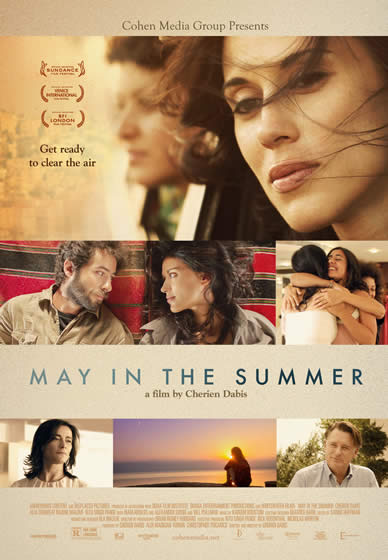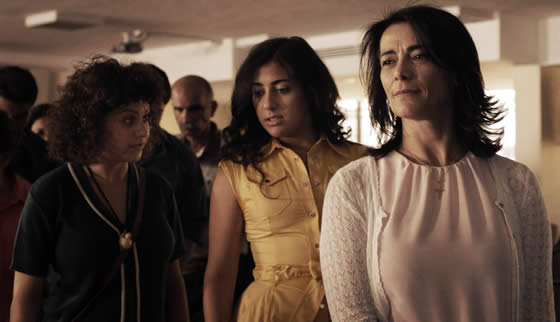 MAY IN THE SUMMER follows sophisticated New Yorker May Brennan to her childhood home of Amman, Jordan for her wedding. Shortly after reuniting with her sisters and their long-since divorced parents, myriad familial and cultural conflicts lead May to question the big step she is about to take.
MAY IN THE SUMMER follows sophisticated New Yorker May Brennan to her childhood home of Amman, Jordan for her wedding. Shortly after reuniting with her sisters and their long-since divorced parents, myriad familial and cultural conflicts lead May to question the big step she is about to take.
MAY IN THE SUMMER, written and directed by Cherien Dabis (AMREEKA), stars Dabis, Alia Shawkat, Nadine Malouf, Ritu Singh Pande, Hiam Abbass and Bill Pullman. The film was produced by Dabis, Alix Madigan-Yorkin and Christopher Tricarico.
Cherien Dabis is an award-winning feature filmmaker who received her MFA in film from Columbia University. She wrote, directed, produced and edited several short films including MAKE A WISH, which premiered at the 2007 Sundance Film Festival, Berlin International Film Festival as well as Clermont-Ferrand, where it won the Press Prize and Jury’s Special Mention, among other awards. Dabis worked for three seasons as a writer and co-producer on Showtime’s groundbreaking, original hit series THE L WORD, before going on to make her feature writing and directorial debut with AMREEKA.
In 2009, AMREEKA world premiered at the Sundance Film Festival, opened New Director’s/New Films at MoMA, and won the prestigious FIPRESCI award in the Director’s Fortnight at Cannes. It was nominated for a Best Picture Gotham Award, 3 Independent Spirit Awards, and was named one of the Top Ten Independent Films of the Year by the National Board of Review.
Bijan Tehrani: My question is how did you come up with the idea with MAY IN THE SUMMER?
Cherien Dabis: I came up with the idea of MAY IN THE SUMMER when I was on the festival circuits with my first film. While I as I was talking about that film and promoting it I realized that it only explored one half of my cultural identity and cultural experience and that was the part of me that is considered an Arab in America. I wanted to look at the other side of my own cultural experience as an American in the Arab world, so that was kind of the first spark of the idea and from there it grew and I started to notice that it was becoming a larger trend, reverse migration. There are a lot of immigrants who are leaving their adopted countries and going home and discovering that they are at various levels of discount with their home culture that they did not quite fit in their either, so I wanted to look at that cultural phenomenon about cultural migration. I also wanted to make a movie about sisters, I love films about sisters, and I have four sisters of my own and I know the dynamic, so those are the things that sparked the idea of the film.
BT: I think that MAY IN THE SUMMER can create a new image of the Middle East, was this intention of yours?
CD: Yes, I definitely wanted to look at a side of the Middle East that we don’t get to see very often, my parents are Palestinian and Jordanian and I grew up in a small town in Ohio and I spent almost every summer of my life going back to Jordan, so I saw the country change dramatically. Even though I am very politically active, I did not grow up like a typical Palestinian, I did not grow up under bombs I did not grow up under occupation, I grew up in a loving family, with all the drama and dysfunctions, surrounded by this amazing culture. Therefore I chose to show a different side of the Middle East in the story that I tell, the side that I am familiar with and the side that I love.
BT: There are so many layers of stories in MAY IN THE SUMMER. How did you balance the numerous layers and themes of the film?
CD: That was a challenge, it is a pretty big ensemble of characters and I think I struggled at different points to find that balance but I think the key was to always to stick with the heart of the story which is May’s story and her journey of self discovery and a very intense inner journey. I had to focus on her and the questions that she was faced with and how could she move forward with her future  even she had not confronted her past and her parents’ divorce.
even she had not confronted her past and her parents’ divorce.
BT: I think it is very challenging for a film director to portray the role of women in a family, how much of the family dynamic was based on your personal experience.
CD: I know the sister dynamic very well, I have a very big and loving family, and it is the type of movie I excel at because it is my own experiences. I went to film school at Columbia that I was able to figure out how to show those dynamics because it was such a great program.
BT: How did you go about casting the film?
CD: The great thing was that I knew two of the actors I wanted to cast before I started writing the script. I had worked with Hiam Abbass and Alia Shawkat on my first film Enrika and really just had a tremendously positive experience working with them and we stayed friends and stayed in touch and I knew I wanted to work with them, so when I came up with this idea it was with them in mind. I got to have conversations with them very early, they got to influence their characters from an earlier stage which was really great for me as well, so it was a great process. Casting myself was unexpected, I did not write the role with myself in mind and I sort of lifted the idea from other people and I reluctantly considered myself after I could not find someone to play the part, so I put myself forward and I had to be honest with myself that I saw something there that I had been looking for and that was how that came about. Bill Pullman was someone I had in mind and he was an adventurous spirit where he not only responded to the script but he also wanted to come to Jordan so that was really amazing and then the other actors; Alexander Siddig is of course fantastic and I met him at a film festival and started a conversation with him about being in the film and he plays a character that is present through his absence, the last sister I found at a casting session in New York. I like to rehearse with my actors, we rehearsed for about two weeks, and is important to just spend time together, especially with the sisters so I brought them to Jordan about 10 days early and I wanted to spend as much time together as possible, so we spent time  together in characters and we spent time together out of character. Just kind of establishing report and relationships and dynamics and getting comfortable with each other so that was a part o that process.
together in characters and we spent time together out of character. Just kind of establishing report and relationships and dynamics and getting comfortable with each other so that was a part o that process.
BT: How did you come up with the visual style of the film?
CD: I let the place influence that, Jordan is a very monochromatic country, it is very washed out and very blown out in the summer time especially the sun is very harsh and hot. Therefore the place really inspired that initial style, I wanted the characters to be very loud within the frame, with bright colors and a lot of textures so we could spot them and find them immediately. The visual style is based on that sense of place and wanting the characters to look out of place and to really stand out and over the course of the film they blend in a little bit more and they become more muted and that was the feel we were going for.
BT: Do you think the English language in the film will help it appeal to US audience?
CD: I hope so, I think that would be great, having the film mostly in English was also authentic to the characters being Arab/Americans; it was a choice that was made for the film and obviously a choice that was made for the marketing and commerciality of the film as well.

